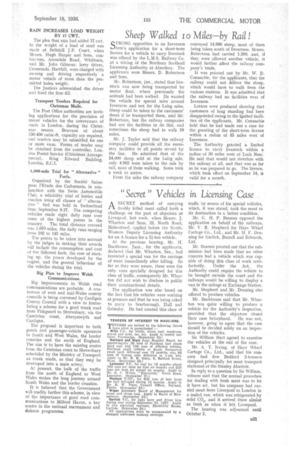" Secret ' Vehicles in Licensing Case .
Page 35

If you've noticed an error in this article please click here to report it so we can fix it.
PiA SECRET method of carrying freshly killed meat called forth a challenge on the part of objectors at Liverpcol, last week, when Messrs. J. Wharton and Sons, 32, North Road, Birkenhead, applied before the NorthWestern Deputy Licensing Authority for an A licence for a 21-ton vehicle.
At the previous hearing, Mr. H. Backhouse, junr., for the applicants, declared that Mr, Wharton, Sen., had invented a special van for the carriage of meat immediately after killing. So far as they were aware, these were the only vans specially designed for this class of traffic, consequently Mr. Wharton did not wish to disclose in public their constructional details.
The application was also based on the fact that his vehicles were working at pressure and that he was being asked to carry to Scarborough, Hull and Grimsby. He had created this class of
traffic by means of his special vehicles, which, it was stated, took the meat to its destination in a better condition.
Mr. G. H. P. Beames opposed the application on behalf of the railways, Mr. V. R. Shepherd for Hays Wharf Cartage Co., Ltd., and Mr_ H. F. Denning.for Garlick, Burrell and Edwards, Ltd.
Mr. Beames pointed out that the submission had been made that no other concern had a vehicle which w-as capable of doing this class of work satisfactorily. Under the Act, the Authority could require the vehicle to be brought outside the court and the railways would be willing to display a van in the sidings at Exchange Station, Mr. Shepherd and Mr. Denning also offered to produce vehicles.
Mr. Backhouse said that Mr. Wharton was quite willing to produce a vehicle for the Authority's inspection, provided that the objectors closed their case beforehand. He was not, however, going to agree that the case should be decided solely on an inspection of the vehicles.
Sir William Hart agreed to examine the vehicles at the end of the case.
Mr. A. T. Irving, of Hays Wharf Cartage Co., Ltd., said that his concern had .five Bedford 2-tonners designed principally for meat transport stationed at the Stanley Abattoir.
In reply to a question by Sir William, witness said that the normal procedure for dealing with fresh meat was to let it 'have air, but his company had carried meat from Liverpool to London in a healed, van, which was refrigerated by solid CO2, and it arrived there almbst as fresh as when it left Liverpool.
The hearing was adjourned until October 2.




























































































